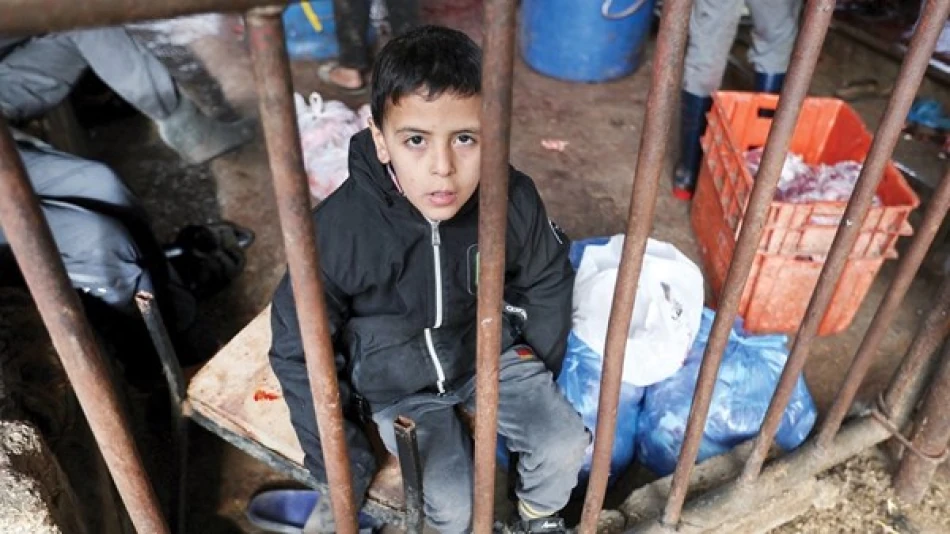
UNICEF Reveals Heartbreaking Toll: 18,500 Children Killed in Gaza Since Conflict Erupted
Gaza's Children Face Unprecedented Humanitarian Catastrophe as Malnutrition Deaths Surge 50% in Three Months
The collapse of Gaza's food system has reached a critical breaking point, with over 18,500 children killed since the war began and malnutrition deaths among children jumping more than 50% in under three months. UNICEF's regional media director for the Middle East and North Africa reveals that 90 children have now died from malnutrition alone, marking an unprecedented humanitarian crisis that threatens to create lasting generational trauma across the territory.
The Scale of Child Suffering
Salim Oweis, UNICEF's regional media director, described the situation as an unparalleled human catastrophe affecting nearly one million children. The statistics paint a devastating picture: children are killed, injured, or forced to flee their homes daily, while many queue for food and water under active bombardment or remain trapped under rubble in overcrowded shelters.
The psychological impact extends far beyond immediate physical harm. "Childhood in Gaza has almost disappeared," Oweis stated, warning of a generation growing up under pressures, deprivation, and psychological trauma that could last a lifetime. Children live in constant fear and hunger, stripped of basic necessities that define normal childhood development.
Medical System Under Collapse
The healthcare infrastructure's breakdown has created a perfect storm for preventable deaths. Children are dying in hospitals without medicine, in shelters nearly devoid of water and food, or in the arms of parents unable to feed them. These deaths, according to UNICEF officials, were entirely preventable and represent a fundamental failure of international protection systems.
Malnutrition Crisis Reaches Critical Levels
July marked a particularly dark milestone, with over 12,000 children diagnosed with acute malnutrition — the highest monthly figure ever recorded. This represents a dramatic escalation from just 2,000 cases in February, illustrating how rapidly the humanitarian situation has deteriorated.
The 50% increase in malnutrition deaths over three months reflects the systematic breakdown of food distribution networks and the impact of restrictions on humanitarian and commercial supplies. This trajectory suggests the crisis will deepen without immediate intervention.
Historical Context and International Precedent
While conflicts have historically impacted children, the scale and speed of deterioration in Gaza represents an extreme case study in how modern warfare affects civilian populations. The concentration of nearly one million children in a confined area under siege creates conditions rarely seen in contemporary humanitarian crises.
International humanitarian law provides clear frameworks for protecting civilians, particularly children, during conflicts. The current situation challenges these established norms and raises questions about enforcement mechanisms when violations occur on such a scale.
International Response and Urgent Demands
UNICEF is calling for immediate international action on multiple fronts: a comprehensive and sustainable ceasefire, unrestricted access for humanitarian and commercial supplies, and protection for civilians and relief workers under international law. The organization emphasizes that every hour of delay means more children die.
The crisis demands a large-scale, urgent response that goes beyond traditional humanitarian aid. The systematic nature of the food system collapse requires rebuilding entire supply chains while addressing immediate life-threatening malnutrition cases.
Long-term Implications
The psychological and physical damage inflicted on Gaza's children will likely have consequences extending decades into the future. Malnutrition in early childhood affects cognitive development, educational outcomes, and long-term health, potentially impacting an entire generation's capacity to rebuild their society.
The international community faces a critical moment where immediate action could prevent further deterioration of what UNICEF describes as an already unprecedented humanitarian catastrophe. The window for preventing long-term generational damage continues to narrow with each passing day.
Most Viewed News

 Layla Al Mansoori
Layla Al Mansoori






